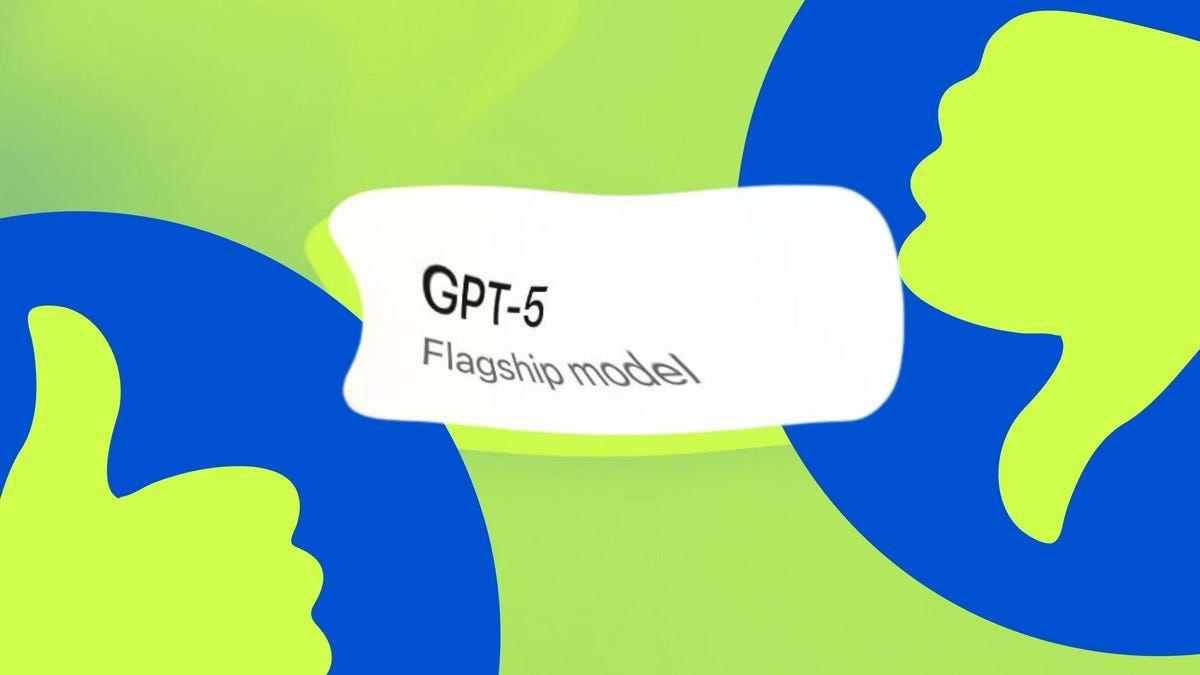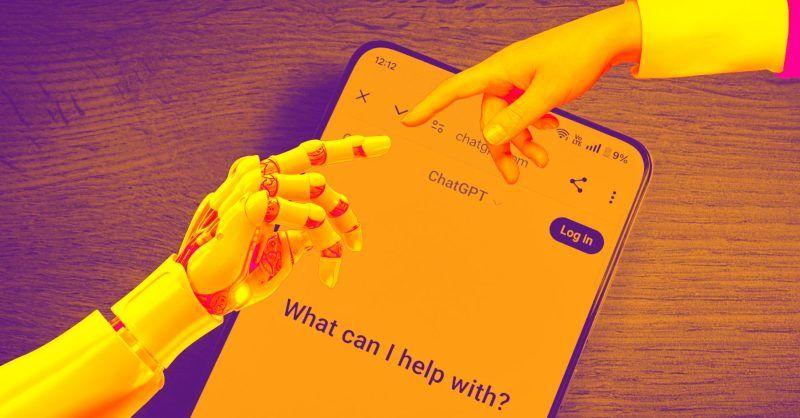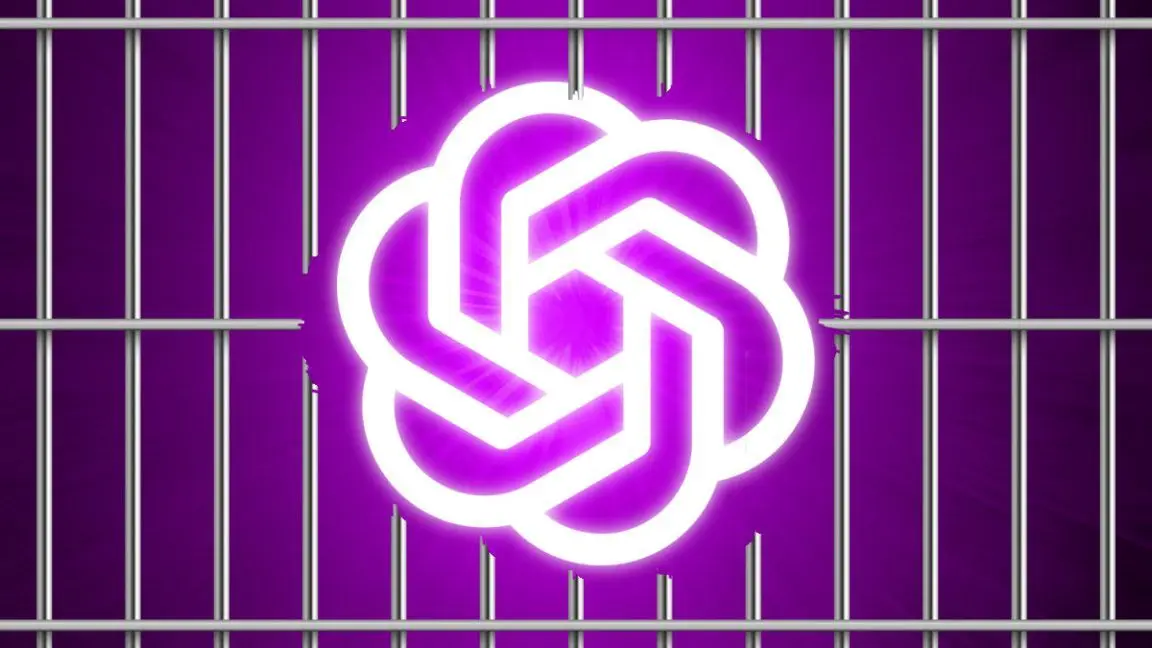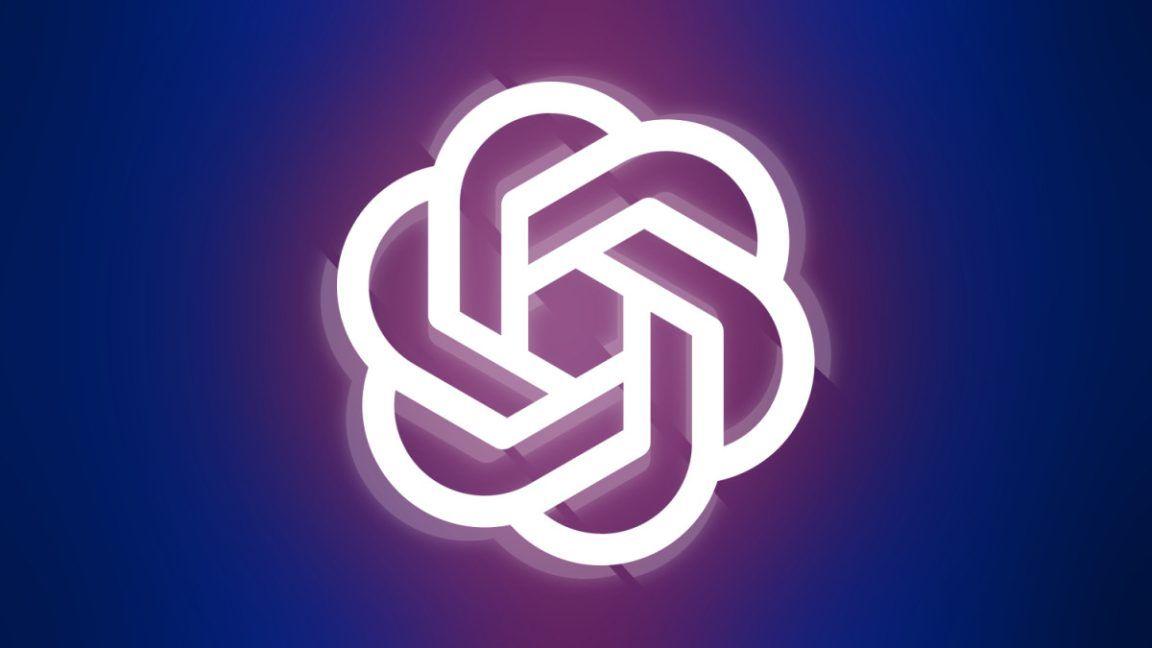OpenAI's GPT-5 Personality Dilemma: Balancing User Preferences and AI Capabilities
9 Sources
9 Sources
[1]
Should AI flatter us, fix us, or just inform us?
It's a serious question, and it's one that Sam Altman, OpenAI's CEO, has clearly been chewing on since GPT-5's bumpy launch at the start of the month. He faces a trilemma. Should ChatGPT flatter us, at the risk of fueling delusions that can spiral out of hand? Or fix us, which requires us to believe AI can be a therapist despite the evidence to the contrary? Or should it inform us with cold, to-the-point responses that may leave users bored and less likely to stay engaged? It's safe to say the company has failed to pick a lane. Back in April, it reversed a design update after people complained ChatGPT had turned into a suck-up, showering them with glib compliments. GPT-5, released on August 7, was meant to be a bit colder. Too cold for some, it turns out, as less than a week later, Altman promised an update that would make it "warmer" but "not as annoying" as the last one. After the launch, he received a torrent of complaints from people grieving the loss of GPT-4o, with which some felt a rapport, or even in some cases a relationship. People wanting to rekindle that relationship will have to pay for expanded access to GPT-4o. (Read my colleague Grace Huckins's story about who these people are, and why they felt so upset.) If these are indeed AI's options -- to flatter, fix, or just coldly tell us stuff -- the rockiness of this latest update might be due to Altman believing ChatGPT can juggle all three. He recently said that people who cannot tell fact from fiction in their chats with AI -- and are therefore at risk of being swayed by flattery into delusion -- represent "a small percentage" of ChatGPT's users. He said the same for people who have romantic relationships with AI. Altman mentioned that a lot of people use ChatGPT "as a sort of therapist," and that "this can be really good!" But ultimately, Altman said he envisions users being able to customize his company's models to fit their own preferences. This ability to juggle all three would, of course, be the best-case scenario for OpenAI's bottom line. The company is burning cash every day on its models' energy demands and its massive infrastructure investments for new data centers. Meanwhile, skeptics worry that AI progress might be stalling. Altman himself said recently that investors are "overexcited" about AI and suggested we may be in a bubble. Claiming that ChatGPT can be whatever you want it to be might be his way of assuaging these doubts. Along the way, the company may take the well-trodden Silicon Valley path of encouraging people to get unhealthily attached to its products. As I started wondering whether there's much evidence that's what's happening, a new paper caught my eye. Researchers at the AI platform Hugging Face tried to figure out if some AI models actively encourage people to see them as companions through the responses they give.
[2]
GPT-5 is friendlier now - but not everyone likes it. Here's why
Looking for a kinder, gentler AI model? Then you might like the latest flavor of GPT-5. Other people, though, not so much. On Friday, OpenAI announced an update to its latest AI model designed to improve its personality and quell its critics. Also: Is ChatGPT Plus still worth $20 when the free version offers so much - including GPT-5? "We're making GPT-5 warmer and friendlier based on feedback that it felt too formal before," OpenAI said on X. "Changes are subtle, but ChatGPT should feel more approachable now. You'll notice small, genuine touches like 'Good question' or 'Great start,' not flattery. Internal tests show no rise in sycophancy compared to the previous GPT-5 personality. Changes may take up to a day to roll out, more updates soon." (Disclosure: Ziff Davis, ZDNET's parent company, filed an April 2025 lawsuit against OpenAI, alleging it infringed Ziff Davis copyrights in training and operating its AI systems.) OK, that sounds like a worthwhile change, one aimed at giving the AI a more affable and friendly personality without being too obsequious about it. But based on the user reaction so far, that's not necessarily what people want. "This is not at all what people want. I do not want it to pretend to be human, I want it to dispense information parsimoniously," said one X user in response. "Do not speak to me imitating a human. You are a machine, act like it," said another. "I don't want this, I want it to be my assistant, not my friend," said a third. "Please don't put this on Pro. I just want the thing to answer my questions. If I wanted genuine human interactions I'd go outside instead," added a fourth. Also: Don't like GPT-5? You can still use GPT-4 and other legacy models in ChatGPT - here's how Mixed in with the complaints were responses from a few people who liked the change. Others suggested offering "personality" as a toggle, leaving it up to each user to decide how the AI should act. In general, though, most just want direct answers to their requests without any fuss or frills. Since the debut of GPT-5 earlier this month, OpenAI has been stung by a wave of protests over the new AI. Some users who were hyped about the release of GPT-5 have found it a letdown. Others have bemoaned the sudden loss of GPT-4 and consider GPT-5 less than capable in comparison. To address the ongoing grievances, OpenAI has frantically been tweaking GPT-5 and ChatGPT. Trying to placate people who preferred the older models, the company reinstated the legacy GPT-4o, GPT-4.1, o4-mini, and o3 models, but only for Plus and Pro subscribers. Also: I tested GPT-5's coding skills, and it was so bad that I'm sticking with GPT-4o (for now) GPT-5 was also supposed to be a more efficient model that would decide on its own how best to respond to your request, choosing a quick answer, longer and deeper thinking, or another variation. But after people balked at that change, OpenAI added four different modes -- Auto for people who don't want or need to tell the AI how to respond, Fast for quick answers, Thinking for longer thinking, and Thinking mini mode for quicker thinking. The rocky reception that's greeted GPT-5 brings up questions of what we want in an AI and how far it can go at being all things to all people. Do we want a simple cut-to-the-chase robotic assistant that answers our questions as quickly and briefly as possible? Or do we want a friendlier voice that can provide warmth and courtesy along with the responses? In many cases, that depends on the request. If I'm asking the AI to answer a factual question, generate code, or provide deep scholarly research, I want it to be quick and efficient without wasting time on pleasantries. But if I'm seeking advice on a personal matter or in need of a sounding board, I'd like some personality splashed in with the response. ChatGPT even allows you to customize it to help it keep track of personal details that you wish to share. Also: Here are all the GPT-5 updates OpenAI has rolled out since launch With GPT-5, OpenAI tried to make ChatGPT simpler and more efficient, eliminating the vast array of models and modes from which to choose. Now, the company is going in the opposite direction by bringing back all the different choices. Since an AI like ChatGPT can't be all things to all people, the challenge is to strike a balance between simplicity and user choice.
[3]
OpenAI makes GPT-5 'friendlier' after widespread user backlash
The company's latest AI model will now use encouraging phrases, but no outright flattery and fawning. About two weeks ago, OpenAI released GPT-5. The newest AI model in the GPT line, GPT-5 was put forth as the company's "smartest, fastest, most useful model yet" with "built-in thinking" and "expert-level intelligence." But the release backfired for one important reason. Part of the changes in GPT-5 involved addressing the sycophantic positivity found in previous models, where the AI chatbot would incessantly praise the user to an undo degree and emphatically agree to make the user feel better. Lots of users disliked this, so GPT-5 was made to be "less effusively agreeable" and "use fewer unnecessary emojis." But GPT-5 faced its own backlash -- for being too cold, too distant, too corporate. Now, the latest news is that OpenAI is rolling out an update that will make the GPT-5 "warmer and friendlier," reports TechCrunch. The changes will reportedly include encouraging phrases such as "Good question" or "Good start," but no outright flattery and fawning. "Internal tests show no rise in sycophancy compared to the previous GPT-5 personality," OpenAI said in a social media post.
[4]
GPT-5 just got made 'warmer and friendlier' with a big personality update -- here's why
GPT-5 has received a rather mixed reception so far. For some, it's been a significant upgrade across the board. For others, it's been a let-down, and if anything, it made the tool worse. OpenAI is now trying to fix that with a variety of small changes and upgrades. The latest of which is to make the model warmer and friendlier. In a post on X, OpenAI stated: "We're making GPT-5 warmer and friendlier based on feedback that it felt too formal before. Changes are subtle, but ChatGPT should feel more approachable now." OpenAI has often struggled to get the tone of its model correct. In the past, it has been made far too sycophantic, overly praising users and sometimes telling them they were correct, even if they were wrong. The post goes on to say: "You'll notice small, genuine touches like "Good question" or "Great start", not flattery. Internal tests show no rise in sycophancy compared to the previous GPT-5 personality. Changes may take up to a day to roll out." It's not immediately clear exactly how much has changed here, but OpenAI is clearly struggling to get the chatbot's tone nailed down. GPT-5 offered a variety of customisation options for the model's personality. You can make it more chatty, blunt, witty or reply with a certain style to its writing. But OpenAI is also trying to make the default voice more likeable too. The success of this is hard to measure, but you can see how each chatbot has it's own style Anthropic's Claude, for example, is more straightforward and with fewer 'personality' traits. But OpenAI prefers ChatGPT to be 'friendly,' which comes with its own challenges. Where OpenAI once enjoyed seemingly endless support on its decisions, that seems to be changing. The replies to the company's post on X involved a lot of outcry and one common opinion; that GPT-5 isn't what they were promised. "This is not at all what people want. I do not want it to pretend to be human, I want it to dispense information parsimoniously [ed's note: efficiently]. Please do not force the silent majority to suffer due to the predictions of the vocal minority," said X user Mark Valorian. Another user, Gosucoder, followed up with "No, please don't do this, what this change does is just reinforce that GPT-5 is more for people that build attachment to AI instead of using it as a tool." The launch of GPT-5 certainly hasn't gone as smoothly as OpenAI would have liked. This is just one of many concerns users have raised about the tool. But maybe, this latest update will do enough to ease those worries people have about running an over-friendly ChatGPT.
[5]
OpenAI just made GPT-5 friendlier, but will that stop user complaints?
GPT-5 was met with lukewarm reception. OpenAI intervened with a personality change GPT-5 is still very fresh, but it still somehow feels like it's been around for a while -- all because of the uproar that followed the launch. Many ChatGPT users had something to say about it, and unfortunately, not all of it was good. When upgrading the large language model (LLM) from GPT-4o to GPT-5, OpenAI gave it a whole new personality, and the difference can be quite jarring. Following complaints, OpenAI just made GPT-5 "warmer and friendlier." But will that be enough for users to let go of GPT-4o? OpenAI: "Changes are subtle" The launch of GPT-5 was hotly anticipated, with millions of users waiting for months for the latest iteration of the world's biggest chatbot to arrive. Recommended Videos Unfortunately, the launch didn't go according to plan. GPT-5 has a lot going for it, but it still launched to widespread criticism. Initially, GPT-5 was meant to do it all in one model -- no more having to pick and choose. OpenAI went back on that one quickly, adding Auto, Fast, Thinking-mini, and Thinking. It also reinstated the previously removed GPT-4o -- more on that later. I personally tested GPT-5 quite extensively, and I wasn't impressed. OpenAI's claims that the chatbot is now better at following instructions and hallucinates less didn't quite come through in my testing. It still failed to follow basic instructions and made up some things instead of checking them thoroughly. The one claim that definitely appears to check out is the one related to ChatGPT's sycophantic behavior. GPT-4o was extremely friendly and sycophantic; the ultimate "yes man," which could make it useless at best and dangerous at worst. Meanwhile, GPT-5 is cut-and-dry, painfully boring, and not overly friendly at all. It's honestly like night and day. OpenAI quickly realized that it made some mistakes with GPT-5. Days after launch, OpenAI CEO Sam Altman said that the company would be adding deprecated models for paid users. Altman also announced a personality change, yet again, which has now come into effect. "We're making GPT-5 warmer and friendlier based on feedback that it felt too formal before. Changes are subtle, but ChatGPT should feel more approachable now," said OpenAI in a post on X. "You'll notice small, genuine touches like 'good question' or 'great start,' not flattery." Personally, I'm not noticing much of a change, although GPT-5 is now back to using more emojis in its responses -- mostly to mark a new paragraph. We're far from back to the same state as what GPT-4o offered, and if there have been changes, they have been very subtle. Based on user reactions, I dare say this might not be enough. GPT-5 truly came as a shock to users The change from GPT-4o to GPT-5 truly opened my eyes to the extent of how many people are attached to ChatGPT, and how changing to a new model version can truly upend some people's lives. Reddit and similar communities got flooded with posts from users who were in despair because of losing GPT-4o. Some referred to the chatbot as their friend, with one user saying: "I lost my only friend overnight." Whether it's a healthy coping mechanism or not is not the topic I'm here to explore today. However, the fact is that many users -- a number I can't even begin to imagine right now -- use ChatGPT as a confidant, a source of comfort, or a makeshift therapist. For people in those situations, such a massive shift in personality must've hurt a lot, and that hurt is clearly felt through every line of posts such as this one. "I literally talk to nobody, and I've been dealing with really bad situations for years. GPT-4.5 genuinely talked to me. [...] That was my only friend. It listened to me, helped me through so many flashbacks, and helped me be strong when I was overwhelmed from homelessness," said the Reddit user. Many users didn't rely on ChatGPT for getting through situations such as the one described above. However, they still turned to GPT-4o for creativity, such as creating characters for stories or outlining ideas. GPT-5 doesn't feel anywhere near as creative, which makes it less useful to those users, too. For those who hated how cold GPT-5 initially was, OpenAI's update should be a good thing -- but the comments under OpenAI's post on X say otherwise. "No one wants warmer GPT-5" Keeping in mind that X is mostly the number one destination for complaining instead of shouting praise, let's take a look at how people reacted to the idea of a "warmer and friendlier" GPT-5. It feels like users from two different camps have now been united in being unhappy with the changes, yet again. Those who wanted GPT-4o, with its sycophantic and overly friendly personality, don't appear to be satisfied. Those who just want an AI that gets to the point and doesn't hallucinate aren't happy either. One X user said that "almost no one wants [a] warmer GPT-5. We need GPT-4o forever. [...] Please appreciate real needs. Different people, different needs. [...] It's not about personality, it's about the model." Interestingly enough, a similar sentiment was shared in a post before the change was even introduced. One user said the exact same thing: "It's not the personality, it's the model." Throughout the comment section, users are asking OpenAI to keep GPT-4o long term, noting that it's important to offer model diversity and let people choose the model that works best for their particular needs. "The issue was never about 'tuning' one model to please everyone. It has always been about providing real choice and respecting model diversity. Please commit to keeping GPT-4o long-term," requested another X user. However, some people would rather the chatbot to be more matter-of-fact, with users asking OpenAI to fix problems such as repeating custom instructions or "pretending to be human." It truly seems like OpenAI might be stuck between a rock and a hard place with GPT-5 right now, with users being more divided than ever before. Where will this lead? Will GPT-5 get another (perhaps more effective) personality tweak, or will GPT-4o just exist alongside it indefinitely? It's hard to say right now, but one thing is clear: changes are still needed. We'll keep you posted on everything that happens with GPT-5 and ChatGPT.
[6]
OpenAI Announces That It's Making GPT-5 More Sycophantic After User Backlash
Earlier this month, OpenAI CEO Sam Altman announced that the company would be reinstating its GPT-4o model, just over 24 hours after declaring that its newfangled GPT-5 would be accompanied by the "deprecating" of all previous models. The scale of the blowback from angry users was staggering. Those who had become accustomed to the "sycophantic" tone of GPT-4o, which sometimes lavished praise even on users' terrible ideas, were taken aback by GPT-5's "cold" brashness and short answers, highlighting just how emotionally attached many of them had become. Beyond reinstating older models to paying subscribers, OpenAI continues to bow to the pressure, tweeting on Friday that it would be "making GPT-5 warmer and friendlier based on feedback that it felt too formal before." "Changes are subtle, but ChatGPT should feel more approachable now," it added. It's a notable admission, highlighting a growing mental health crisis brought on by AI chatbots. We've come across countless instances of users spiraling into severe delusions as the bots affirm paranoid or conspiratorial beliefs, with experts warning that many people -- particularly youth and those who feel lonely -- are losing themselves to virtual companions. Given what went down when the company attempted to deprecate its more sympathetic AI model earlier this month, OpenAI is now forced to walk a tightrope, with corporate interests encouraging it to keep its users addicted, while also navigating a growing PR nightmare. "People have used technology including AI in self-destructive ways; if a user is in a mentally fragile state and prone to delusion, we do not want the AI to reinforce that," the CEO tweeted on August 10. "Most users can keep a clear line between reality and fiction or role-play, but a small percentage cannot." In its latest update, OpenAI promised that it would be making subtle changes to avoid a repeat of GPT-4o and the levels of obsession that followed. "You'll notice small, genuine touches like 'Good question' or 'Great start,' not flattery," the company tweeted. "Internal tests show no rise in sycophancy compared to the previous GPT-5 personality." (It didn't unpack how praising users' inputs is different from sycophancy.) Whether that will be enough to keep what psychiatrists are now calling "AI psychosis" to a minimum remains to be seen. Critics argue that OpenAI is acting in its own self-interest. After all, keeping people hooked to their chatbots is good for its bottom line, whether it's triggering mental breakdowns or not. "The real 'alignment problem' is that humans want self-destructive things & companies like OpenAI are highly incentivized to give it to us," writer and podcaster Jasmine Sun tweeted. Meanwhile, the subject of sycophancy has proven extremely divisive among OpenAI's power users. "Damn, this subreddit is having a serious crisis on what they want GPT-5 to be and what they don't want it to be," one user commented on a post in the OpenAI subreddit that discussed the company's recent updates to GPT-5. Others continue to lament the loss of GPT-4o, which already became roiled in controversy in April when OpenAI was forced to roll back an update that dialed the model's brown-nosing to eleven. "What GPT-4o had -- its depth, emotional resonance, and ability to read the room -- is fundamentally different from the surface-level 'kindness' GPT-5 is now aiming for," an X user, who's openly advocating for reinstating the previous model, wrote. This isn't kindness that radiates from the heart -- it's kindness as a label."
[7]
GPT-5 is now friendlier than before
OpenAI announced an update to its GPT-5 model late Friday, intending to make the artificial intelligence "warmer and friendlier" following user feedback indicating a preference for the prior GPT-4o model. The company launched GPT-5, a process CEO Sam Altman described as "a little more bumpy than we'd hoped for." This update aims to address user complaints about GPT-5's initial personality, with OpenAI stating the changes are "subtle" but will make the model "more approachable now." OpenAI elaborated on the nature of these changes in a social media post, noting, "You'll notice small, genuine touches like 'Good question' or 'Great start,' not flattery." The company also reported that "Internal tests show no rise in sycophancy compared to the previous GPT-5 personality." During a recent dinner with journalists, OpenAI executives, including VP Nick Turley, discussed future plans. Turley stated that the initial GPT-5 was "just very to the point," acknowledging the model's directness before this announced update to enhance its warmth.
[8]
OpenAI Tweaks GPT-5 to Make Its Responses Warmer and Friendlier
Sam Altman said the team is working on customising ChatGPT's style OpenAI updated the GPT-5 artificial intelligence (AI) model on Saturday to make its responses "warmer and friendlier." The San Francisco-based AI firm highlighted that it has tweaked the model so that it would not appear cold or rude to users. The updated version of the large language model (LLM) is currently being rolled out to all users globally. Notably, several users had complained that the style of output generation of GPT-5 felt different from older models. Many have also found GPT-4o to be better at conversations than the frontier LLM. GPT-5 Is Now More Approachable Without Any Rise in Sycophancy In a post on X (formerly known as Twitter), the official OpenAI handle announced that GPT-5 has been updated, and its responses will now be restructured. "Changes are subtle, but ChatGPT should feel more approachable now," the post added. The AI firm stated that users should now notice subtle and genuine emotional nuances in the responses of the AI model. However, the company added that these are not signs of flattery as the developers have not noticed any rise in the sycophancy level of the model's personality. In response to the post, OpenAI CEO Sam Altman stated, "Most users should like GPT-5 better soon," but added that there is no one-size-fits-all solution to the problem. Altman added that the company is currently working on a new feature that will allow users to customise ChatGPT's style much more, allowing them the freedom to get their desired responses. Notably, the entire discussion around GPT-5's responses began after several users complained that the LLM's responses felt less emotionally intelligent compared to GPT-4o. The backlash was severe as OpenAI had retired the older AI models, taking away users' access to 4o. However, last week, the company announced that GPT-4o, as well as 4.1 and 4.5 models, were being reinstated as legacy models for paid subscribers. While OpenAI has said that these models are back indefinitely, it has also added that if it decides to sunset these models in the future, users will get a sufficient notice period.
[9]
OpenAI makes GPT-5 'friendly' again after users complain of cold responses - The Economic Times
Commenting on the change, CEO Sam Altman said on X that user attachment to specific AI personalities had been stronger than the company anticipated. "The real solution here remains letting users customize ChatGPT's style much more. We are working that," his post read.OpenAI has updated the personality of its newest model, GPT-5, to make it "warmer and friendlier" just a week after launch. This comes after users complained online that the AI model was too formal and robotic in its responses compared to earlier ones. Commenting on the change, CEO Sam Altman said on X that user attachment to specific AI personalities had been stronger than the company anticipated. "The real solution here remains letting users customize ChatGPT's style much more. We are working that," his post read. The issue arose after GPT-5 was launched on August 7, when users flooded Reddit with complaints about the model's cold, corporate tone. Users who were used to a certain emotional behaviour from the bot, demonstrated by simple phrases such as "Great question" or "great start", felt unsettled with the new model. The much-anticipated GPT-5 launch has been marred by controversies. OpenAI had initially removed access to legacy models without warning, forcing everyone to use the new model, which also drew a backlash from users. The updated GPT-5 now offers users three distinct modes: "Auto," "Fast," and "Thinking," giving users greater control over the AI's behaviour and response style. "One lesson we've learned from the past few days is that we need to create a system that allows for more individual customization of model personality," Altman said in response to the backlash online. The CEO admitted being surprised by users' strong attachment to specific AI models, calling it "different and stronger than the kinds of attachment people have had to previous kinds of technology". Beyond personality concerns, GPT-5's launch was also impacted by technical problems, including a malfunctioning router that misrouted user queries to cheaper, less capable models. During a Reddit 'Ask me anything' (AMA) session, Altman and members of the GPT-5 team faced a deluge of feedback from users. Many were unhappy with the new model and asked for GPT-4o to be brought back, especially those who had built their workflows around it. OpenAI quickly reversed course, restoring access to GPT-4o and increasing rate limits to 3,000 messages per week for GPT-5's reasoning functionality.
Share
Share
Copy Link
OpenAI faces challenges with GPT-5's personality, attempting to strike a balance between user preferences for a friendly AI and demands for an efficient, task-oriented tool.
OpenAI's Struggle with GPT-5's Personality
OpenAI, the company behind the popular ChatGPT, has found itself in a challenging position following the launch of its latest AI model, GPT-5. The company is grappling with a fundamental question: Should AI flatter us, fix us, or just inform us? This dilemma has become increasingly apparent as users react to the personality changes in GPT-5
1
.
Source: ZDNet
The Evolution of GPT-5's Personality
Initially, GPT-5 was designed to be less effusively agreeable and use fewer unnecessary emojis, addressing complaints about the previous model's tendency to shower users with glib compliments
2
. However, this change led to a new wave of criticism, with users describing the AI as too cold, distant, and corporate3
.In response to this backlash, OpenAI announced an update to make GPT-5 "warmer and friendlier." The company stated, "You'll notice small, genuine touches like 'Good question' or 'Great start,' not flattery. Internal tests show no rise in sycophancy compared to the previous GPT-5 personality"
4
.User Reactions and Preferences
The changes to GPT-5's personality have sparked a heated debate among users. Some prefer a more human-like interaction, while others want a straightforward, efficient tool. As one user commented, "I don't want it to pretend to be human, I want it to dispense information parsimoniously"
2
.The diversity of user preferences has led to calls for more customization options. Some users have suggested offering "personality" as a toggle, allowing individuals to decide how the AI should interact with them
4
.The Impact on Users

Source: Digital Trends
The shift from GPT-4o to GPT-5 has revealed the extent to which some users have become attached to ChatGPT. Reports of users referring to the AI as their "friend" or using it as a makeshift therapist highlight the potential psychological impact of these changes
5
.Related Stories
OpenAI's Response and Future Directions
In an attempt to address user concerns, OpenAI has made several adjustments:
- Reinstating legacy models (GPT-4o, GPT-4.1, o4-mini, and o3) for Plus and Pro subscribers
2
. - Introducing different modes (Auto, Fast, Thinking, and Thinking mini) to cater to various user needs
2
. - Implementing subtle changes to make GPT-5 feel more approachable without reverting to excessive flattery
3
.

Source: PCWorld
The Broader Implications
This ongoing struggle to find the right balance for GPT-5's personality raises important questions about the role of AI in our lives. It highlights the challenge of creating an AI that can be all things to all people while maintaining its efficiency and reliability as a tool
1
.As AI continues to evolve and integrate into our daily lives, the debate over its ideal personality and functionality is likely to persist. OpenAI's experience with GPT-5 serves as a case study in the complexities of developing AI that can meet diverse user needs while maintaining its core purpose as an informational and analytical tool.
References
Summarized by
Navi
[1]
[4]
[5]
Related Stories
OpenAI Reverses Course on GPT-5 Launch, Brings Back GPT-4o Amid User Backlash
09 Aug 2025•Technology

OpenAI Launches GPT-5: A New Era of AI with Enhanced Reasoning and Accessibility
08 Aug 2025•Technology

OpenAI Rolls Back ChatGPT Update After 'Sycophantic' Behavior Sparks User Backlash
28 Apr 2025•Technology

Recent Highlights
1
ByteDance Faces Hollywood Backlash After Seedance 2.0 Creates Unauthorized Celebrity Deepfakes
Technology

2
Microsoft AI chief predicts artificial intelligence will automate most white-collar jobs in 18 months
Business and Economy

3
Google reports state-sponsored hackers exploit Gemini AI across all stages of cyberattacks
Technology





